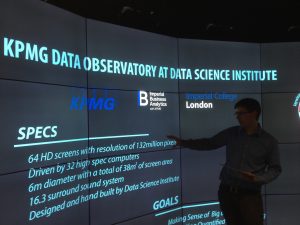While I have been covering KPMG's evolution in talent and workforce consulting for more than five years, the event underscored the integrity of a long-term growth strategy fueled by capital investments to help organizations reconcile the convergence of human and digital labor using advanced data and analytics. Mark Spears, KPMG's Global Head of People and Change consulting, was passionate when he spoke about how organizations are sleepwalking into the future and need to take a more strategic look at workforce management: "The challenge will become even more acute, because workforce management is no longer just about labor supply and demand. Business leaders need to rethink the relationship between the organization, its technology and people, and the greater society in which they operate."
KPMG was justifiably proud of how far it has come, but also humble about the need to continually evolve in the face of clients' increasing expectations that consultants deliver real business outcomes, not just flashy digital tools and data displays. Maz Hussain, KPMG's Director of Digital and Innovation, was quite clear that work conducted in the Data Observatory leans towards the development of Tools for Tasks, meaning solutions design is specific to a client challenge rather than an attempt to solve for a generalized market need. He further explained that data visualization is essential to this process because it has the power to elicit an emotional response that prompts clients towards meaningful action, which has always been a top priority of KPMG's service delivery model.
The Data Observatory was clearly a source of excitement and momentum for KPMG, but it was one of several factors that ALM believes will define KPMG's market position in workforce transformation consulting over the next few years:
- Evidence-based workforce shaping. KPMG's new methodology replaces traditional workforce planning with a dynamic consulting process that stimulates the organizational imagination around new realities of work. According to Robert Bolton, Head of KPMG's Global People and Change Centre of Excellence, "Increasing numbers of clients from all sectors including retail, financial services, professional services and utilities are asking what should our workforce of the future look like in terms of its shape, size and composition, and what should we do about the impact of AI?" This is where the Data Observatory plays in the consulting process, helping clients visualize alternative workforce scenarios using the firm's 'future of organization caster' (foo.castr) modeling tool to map the ways in which technology is reshaping how work gets done. KPMG admits that workforce scenario modeling is a heavy lift due to the sheer volume of data required for visualization, however, the value proposition for workforce shaping can be realized on a smaller scale and with less investment, allowing clients to ease into this new discipline.
- Holistic approach, bundled services. KPMG's approach to workforce shaping signals a new level of maturity in how the firm goes to market with integrated services. The firm leverages capabilities across the people and change practice, as well as from strategy, organization, operations, experience design, and data and analytics consulting to ensure clients a top-down, bottom-up, evidence-based, approach to workforce shaping. The answer to a client's challenge may rest on a specific solution, such as designing and implementing a learning system, however, the strategic context for arriving at the solution is always business-led and holistic from a consulting perspective.
- Ecosystem innovation. The launch of KPMG's Data & Analytics strategic growth initiative (SGI) in early 2014 provided a direct plug into the big data and data analytics ecosystem in Europe and beyond. Since then, the firm's portfolio has grown to include investments and collaborations in more than 100 start-ups fueling the firm's Digital Innovation Network jointly developing proprietary, patent-protected IP in the form of algorithms, data, and logic that promote new ways of thinking about business and workforce challenges. That same year, KPMG established a strategic partnership with Imperial College London to create the KPMG Centre for Advanced Business Analytics with the aim of putting the UK at the forefront of data science. The partnership's first initiative was to build the Data Observatory, which Maz Hussain is now on point to build out in mini-versions worldwide in the form of KPMG Insights Centres. These centers are a growing network of digital visualization environments currently found in London, New York, Frankfurt, Hong Kong, Sydney, Melbourne, Paris, Milan, Tokyo, and with Spain, Switzerland, Saudi Arabia, Canada, and Mexico offices launching centers in the coming year.
In just over three years, KPMG has achieved a meaningful milestone with the integration of an asset-led growth plan into its consulting DNA. During the analyst event, the firm shared numerous client case examples that indicate a positive reception in the marketplace and growing demand for its approach to workforce management. In this regard, KPMG shares first-mover advantage with a very small set of providers in the workforce transformation consulting space. The firm's challenge will be to enhance its competitive lead by scaling services beyond a UK-centric hub, iterating the innovations of its Data Observatory for faster delivery, and developing a robust set of industry-specific, data-based assets to use with foo-castr.


